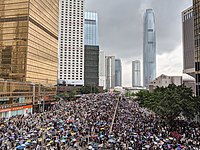
Photo from wikipedia
Hong Kong used to be a city of disappearance (Abbas [1997] 2008), where change was the norm. Yet, unprecedented changes that happened just within the past decade left the city… Click to show full abstract
Hong Kong used to be a city of disappearance (Abbas [1997] 2008), where change was the norm. Yet, unprecedented changes that happened just within the past decade left the city in shock. No one was expecting to see cultural workers and educators being put in custody for publishing politically “inappropriate” contents, examples including popular songs and children’s books that depict sheep being attacked by wolves—an allusion to the state crackdown on prodemocracy activists in the city; nor did anyone expect the dramatic closure of Apple Daily, an outspoken, pro-democracy tabloid that never hesitated to criticize Beijing or expose local cases of corruption for its 26-year-long life in Hong Kong. The series of drastic changes have pushed Hong Kongers to archive every disappearing thing as much as possible. Meanwhile, people are leaving or, more precisely, have been leaving the city that is being forced to shed its characters of Hong Kong-ness. As of July of 2021, the departure hall of Chek Lap Kok International Airport was crowded with passengers and their families in tears; flights were packed with desperate travelers leaving for the UK to make use of their last chance granted by Leave Outside the Immigration Rules (LOTR). It is certainly impossible for one to pack up a beloved city and leave for a new home elsewhere and not everyone can afford to leave. The beaches and harbors cannot be relocated; the local-grown vegetables and chickens cannot be relocated elsewhere as the soil and water of Hong Kong cannot be brought across borders. At the same time, those who have decided to stay must prepare themselves for a continuously, rapidly changing Hong Kong that totally erases its existing uniqueness as Hong Kong. In terms of food, it has become increasingly difficult for the remaining Hong Kongers to afford local-grown produce due to decreasing productive farmlands in Hong Kong, that once gave rise to transformative planning practices that were seemingly bringing hopeful, regenerative politics and more prospects for a socio-ecologically sustainable Hong Kong (Huang 2021). Existing literature and popular media have been paying attention on how Hong Kongers have brought their recipes and cuisine styles with them to their second home locations such as Vancouver, Toronto, London, Taipei, etc. Among others, cha chaan teng—Hong Kong style cafes that serve affordable, hybrid forms of food—has been recognized as one of the most well-known social spaces through which overseas Hong Kongers would retrieve and retain the daily taste of Hong Kong. For instance, the successful consumption and heritagization of Hong Kong style milk tea testified to Hong Kongers’ presence in many global cities around the world (Mak 2021). Heritage in Hong Kong has never been just about tradition or authenticity but (re)invention. Old Hong Kong has
Journal Title: Inter-Asia Cultural Studies
Year Published: 2023
Link to full text (if available)
Share on Social Media: Sign Up to like & get
recommendations!